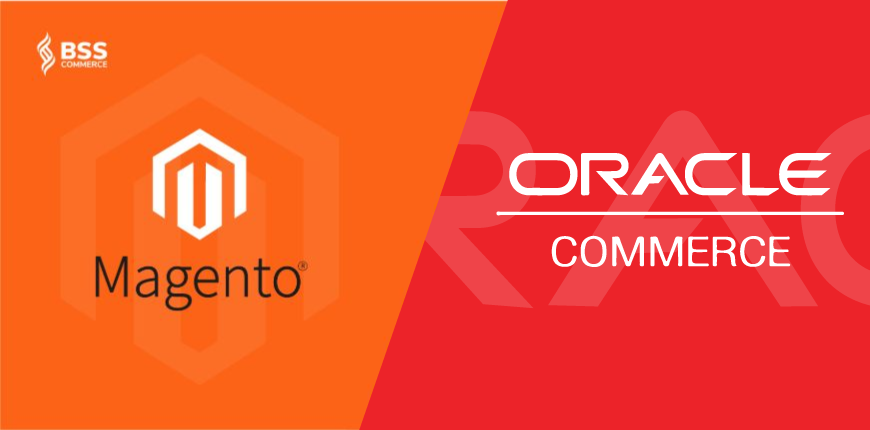For merchants who plan to build a medium-to-large B2B website, chances are they will consider two brilliant options in the market: Oracle Commerce vs Magento. These two candidates always stand in ranking lists of the best B2B eCommerce platforms for wholesale eCommerce businesses. Besides, they become ideal platforms to develop a B2C eCommerce website that meets the essential demands of store owners.
In general, while Oracle Commerce offers more advanced functionalities for large and specialized online business machines, more detailed evaluations show that Magento (both free and paid license) outperforms its rival in areas like total cost ownership (TCO), especially with a wide range of Magento 2 solution providers serving B2B websites.
Thus, this article will compare Magento vs Oracle Commerce in terms of market share, pricing, time-to-market, prominent features, and some other criteria.
For more interests, let’s take a look at some e-commerce platform comparisons to broaden your choices:
- Magento vs Salesforce Commerce Cloud
- Magento vs Oro Commerce
- Magento vs Shopify
- Magento vs SAP Commerce Cloud
*Note: Regard this paper as the starting point of your consideration process to select the best solution provider. We dig deep and highlight the pros and cons of each platform under key issues to help you quickly make the right decision.
Oracle Commerce vs Magento: A Battle of Two Commerce Leaders
Table of Contents
What is Magento? Overall, Magento has long been a global leader in the eCommerce community, thanks to its robust site capabilities and diverse options of premium extensions for Magento 2. Currently, Magento offers 3 editions including Magento Open Source (free), Magento Commerce, and Magento Commerce Cloud (Paid).
>>> ABSORB Magento 2 tutorial for a deeper understanding of the Magento platform and differences among available editions.
Meanwhile, Oracle Commerce is a cloud platform service that has the ability to personalize businesses’ engagement with their customers. About its available edition, Oracle still supports ATG but also has launched Oracle Commerce Cloud.
The battle of Oracle Commerce vs Magento 2 seems to have never ended because each platform has its own strengths and weaknesses that attract customers in different aspects.
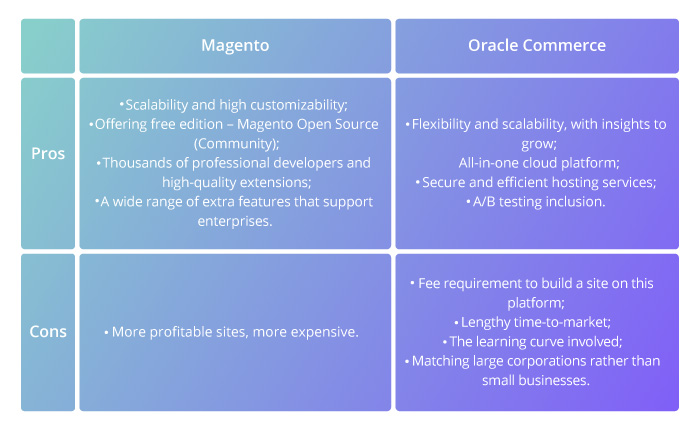
Criteria to Compare Magento vs Oracle Commerce
Prominent Features
Of course, both platforms are fully-featured commerce leaders, with an outstanding feature set to meet the business demands of running a professional website. Nevertheless, Oracle Commerce requires merchants to purchase components separately. We present here the top features of Oracle Commerce vs Magento for a quick view.
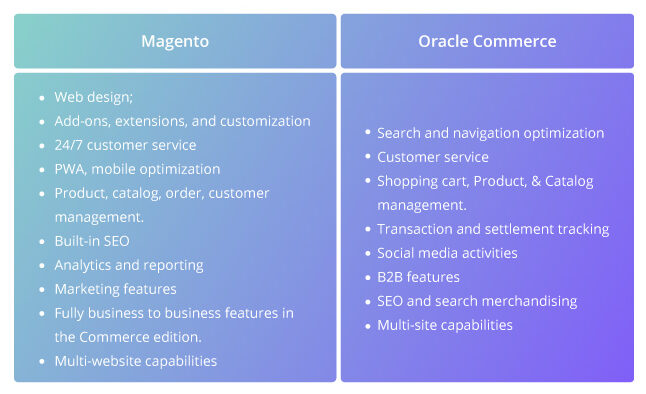
>>> Don’t Use Magento Until You Read This: Magento 2 Community Vs Enterprise
Business-to-business (B2B) Features
B2B features are worth breaking into a separate section with detailed explanations because this is a criterion that many of our clients are interested in when exploring platforms’ features.
Magento is adept at designing a one-size-fits-all solution for B2B eCommerce businesses with immense flexibility for company site development, making it the #1 platform for B2B over the years. On the contrary, Oracle Commerce focuses on delivering personalized experiences to each business to maximize brand identity and simple data management.
Magento
No matter which Magento 2 editions you intend to use, you can easily find powerful tools/solutions to build a B2B or B2M site with essential wholesale features.
1. Magento Commerce (Paid)
The fact business customers appreciate professionalism and personalization has motivated Magento Commerce to include must-have B2B features. These integrated Magento 2 B2B features have taken the business customer experience to a new level, reducing unnecessary costs, increasing engagement/interaction, and promoting consistent development.

The main subjects of this B2B solution set are Companies (sellers and buyers), who can:
- Allow B2B customers to conveniently manage company accounts, purchases, quotes, and credit with self-service tools;
- Assign roles and access permissions to specific users per company;
- Raise the checkout rate and boost sales by accepting payments on account;
- Provide shared catalogs and custom pricing to acquire customer engagement and loyalty;
- Streamline the negotiation process with a smart request for quote workflow;
- Enable business buyers to search products, upload CSV files, and checkout under a single quick order form;
- Expedite restocking by facilitating customers to customize their requisition lists of frequently purchased items;
- Fasten the reorder process;
- Handle large orders with up to 300 line items out-of-the-box.
- Fuel growth with insights from over 25 B2B-focused reports presented in easy-to-use dashboards;
- Request other services including customization, enterprise system integration (ERP/ PIM/ CRM/…); API integration, and more.
Beyond this, corporate customers can use Magento shipping, which is a feature that has multi-carrier shipping. In brief, the B2B features of Magento Commerce complement each other to give both sellers and buyers the most satisfying experience, with immense customization capabilities to suit different brands.
2. Magento Community (Free)
Are you on a tight budget but still craving to deliver a well-performing B2B site to corporate customers? Then you can completely use Magento Community (free) and install Magento 2 B2B extensions from trustworthy vendors. These modules act as strong weapons to reinforce your Magento 2 online store and ensure great performance. Jump into BSS Commerce extension for wholesale businesses to see how they can embrace stages of the B2B customer journey.
Magento 2 B2B eCommerce solution keeps track of customers’ buying journey, from their first approach to your business until they come back for purchase the next time. Magento 2 B2B extensions are a combination of features similar to Magento Commerce B2B features and supreme features. It doesn’t basically stay at B2B business but serves broader client segmentation – B2B and B2C – at a much more competitive price point.
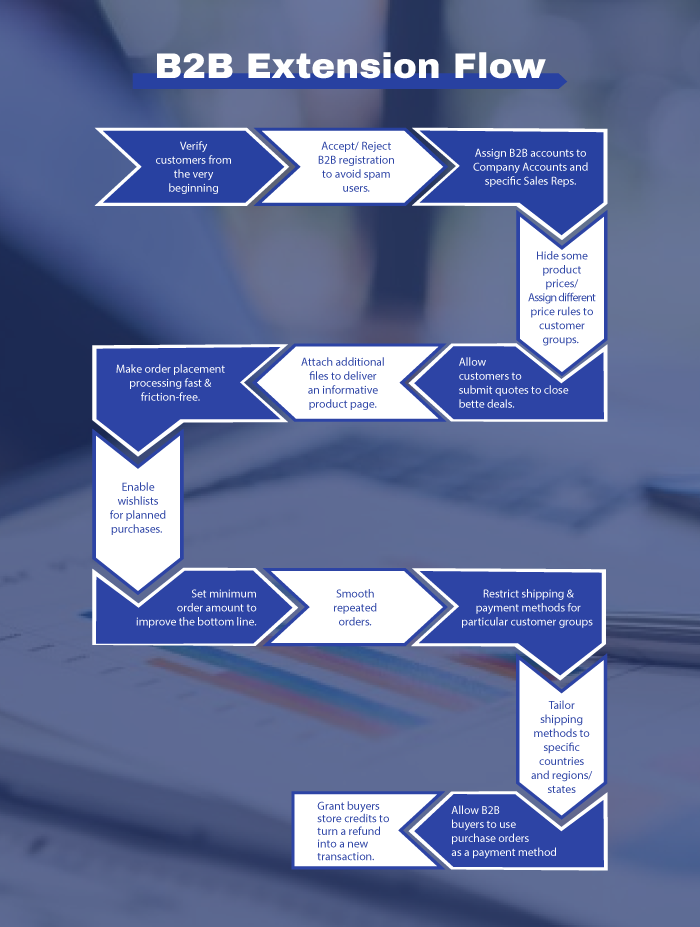
Oracle Commerce
The platform enables users to manage their entire eCommerce website from the same channel. Merchants can control anything from the layout to the merchandising.

The Oracle Commerce B2B functionalities do:
- Customize catalogs and pricing;
- Support product display, sorting, and stock information;
- Keep control of business operations with account hierarchies and permissions;
- Offer customer tier ranking based on business volume;
- Simplify approval workflow;
- Allow business buyers to place orders through their own procurement system with punchout capabilities;
- Include requisition list and quick reorder feature;
- Other services include customization, enterprise system integration (ERP/ PIM/ CRM/…); API integration, and more.
>>> CHECK OUT: B2B Web development service if you are planning to build a wholesale website.
So, Why Magento for B2B?
Due to the cumbersome workload and the multi-tier business apparatus, B2B sellers always appreciate a professional solution that still saves their time and costs. There is no way they’re willing to spend huge sums of money on constructing a massive B2B website without clearly estimating the return on investment and profit margin.
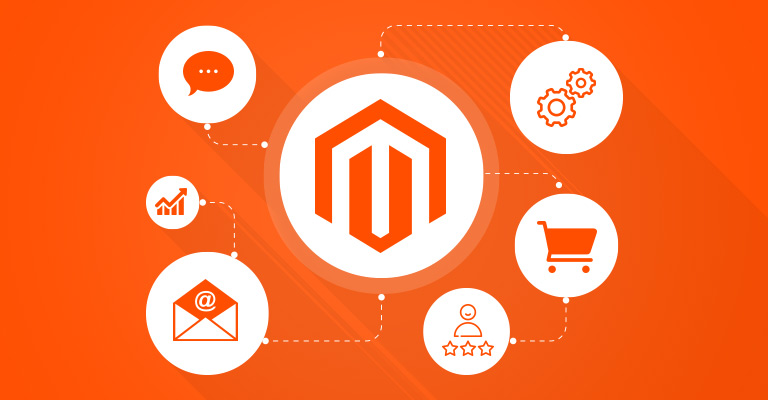
For that reason, merchants always prefer Magento thanks to all-in-one B2B eCommerce solutions available in this platform, which helps them minimize time and money for developing a B2B website. With Magento, you are able to calculate the total cost of ownership, decide which Magento 2 B2B extensions would live up to your specific requirements, reduce customization efforts, and launch a well-performed wholesale website shortly.
On the contrary, when comparing Oracle Commerce vs Magento, you can easily notice that Oracle B2B Commerce delivers self-service eCommerce experiences across the channels and tailors the website functionality to each business, instead of an A2Z solution like Magento. This unified digital commerce service meets the complex demands of B2B sales and scales online businesses at a much higher price point.
Usage Prospects
In this first prospect, Magento has taken the lead over Oracle Commerce. This is a remarkable comparison because it represents broad coverage and brand equity.
To be more specific, at the moment, we witness an extremely stable upward trajectory in the number of new websites adopting Magento (with over 40k websites, according to Similarweb statistics), which has made this platform become the current rival in Top 100K Sites, Top 1M Sites, and The Entire Web. Unfortunately, perhaps due to a narrow target customer network, Oracle Commerce can only get 2000 websites, along with fluctuations in new usage.
It can be easily seen that the number of Magento new websites is 20k times as many as that of Oracle.
Below are specific data on the number of websites using Oracle Commerce vs Magento divided by region. Let’s take a look to catch the trend of using these two platforms of e-commerce businesses.
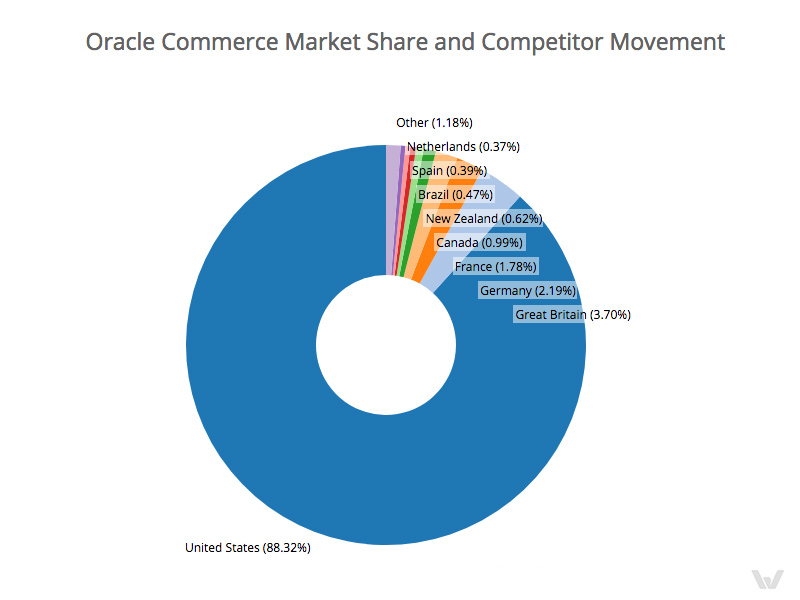
Source: Web4pro.net
On one hand, Oracle Commerce occupies about 0.1% of the entire Internet. As the pie chart shows, there are around 20 000 US-based businesses utilizing Oracle Commerce, which takes up 88.32% of the total. This number in the United States accounts for almost the entire chart and leaves the closest competitors, the UK or Germany, behind with a huge gap.
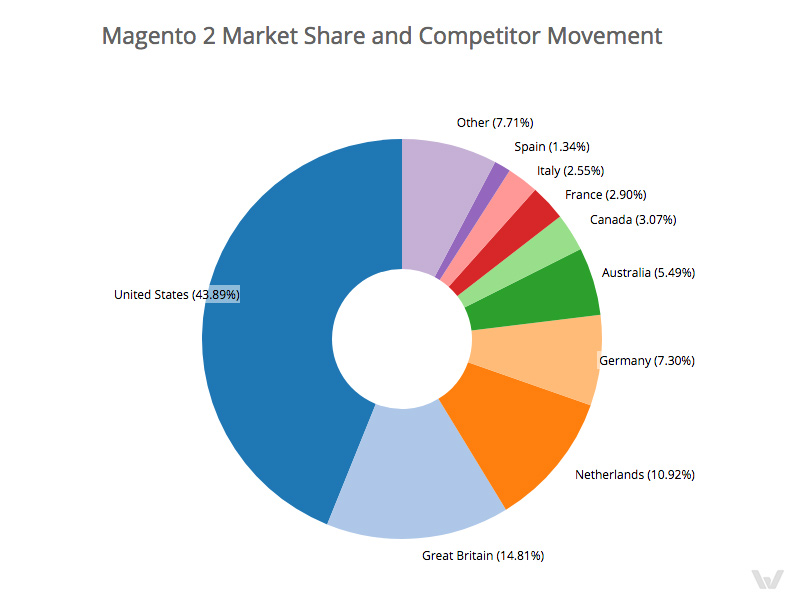
Source: Web4pro.net
On the other hand, 216 024 Magento websites are being run by eCommerce businesses. Among them, there are more than 21 000 sites functioning on Magento 2, and this usage rate doesn’t stop here.
Multi-Industry Support
In addition to the number of uses, Magento is now dominant in all major industries, including Lifestyle, Home & Garden, E-commerce & Shopping, Computers Electronics & Technology, and others.
-
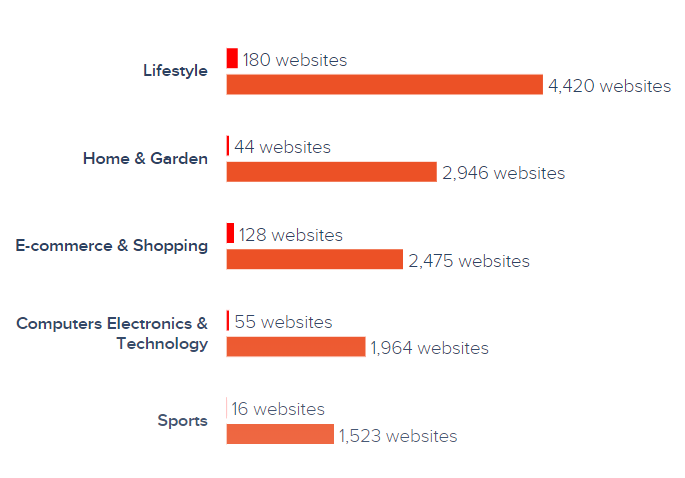
(Orange is Magento, Red is Oracle, according to SimilarWeb Statistics)
Giant brands using Magento can be mentioned here such as Nike, HP, Aldo, boxycharm.com, Rosetta Stone, Easton, and Olympus; while others like Orange, Kohls, Screwfix, liverpool.com.mx operate on the Oracle Commerce platform.
Pricing
Not only grabbing a larger market share, but Magento also beats Oracle Commerce when it comes to pricing on any Oracle Commerce vs Magento comparison table.
Although both competitors don’t have a fixed price for site construction, according to previous users’ records, the ongoing costs of Oracle are 2x higher than Magento. This price gap even doubles when you use the Commerce Cloud premium version of the two platforms.
In fact, it’s complicated to estimate the cost of Oracle Commerce. At first glance, the cost of these two will equal out after 6 years of use, after which Magento will become more expensive. However, the following bullet points regarding running an Oracle Commerce site prove that it doesn’t turn out as we think:
- Users must pay additional fees for Java & PHP applications;
- Oracle Commerce Cloud requires the purchase of a license for an ad server, such as WebLogic;
- Depending on your business needs, you may need to purchase Oracle Database, a service with extremely complex pricing;
- Customers, such as loyalty members, who register for your site, will be charged a Named User License fee.
Minimizing such extra costs, Magento offers a more affordable price at high quality. Basically, we summarize the cost of developing a website on the Magento platform in the table below:
Costs of each Magento Edition (per year)
| Av Gross Sale Revenue per year | Open Source | Commerce | Commerce Cloud |
| <$1,000,000 | $0 | $22,000 | $40,000 |
| $1,000,000 – $5,000,000 | $0 | $32,000 | $55,000 |
| $5,000,000 – $10,000,000 | $0 | $49,000 | $80,000 |
| $10,000,000 – $25,000,000 | $0 | $75,000 | $125,000 |
| >$25,000,000 | $0 | $125,000 | $190,000 |
For merchants running a B2B eCommerce business, they can utilize Magento Open Source integrated with Magento 2 B2B extensions or the two advanced Magento editions which have included full B2B features to ensure the best website performance.
Time-to-Market
On the whole, the website development process in Oracle Commerce will take 2x to 3x longer than it will in Magento due to multiple integration requirements from eCommerce sites built in the former.
For instance, depending on the customization requests and add-ons applied to the website, it takes from two weeks to 6 months to completely build and launch a Magento site, while an Oracle website’s time-to-market is months to years. This lengthy process often leads businesses to seek assistance from Oracle recruiters who specialize in finding professionals capable of navigating the complexities of Oracle’s platform.
How Magento Defeats Oracle Commerce
It’s likely for merchants to confront serious trade-offs when choosing Oracle Commerce over Magento:
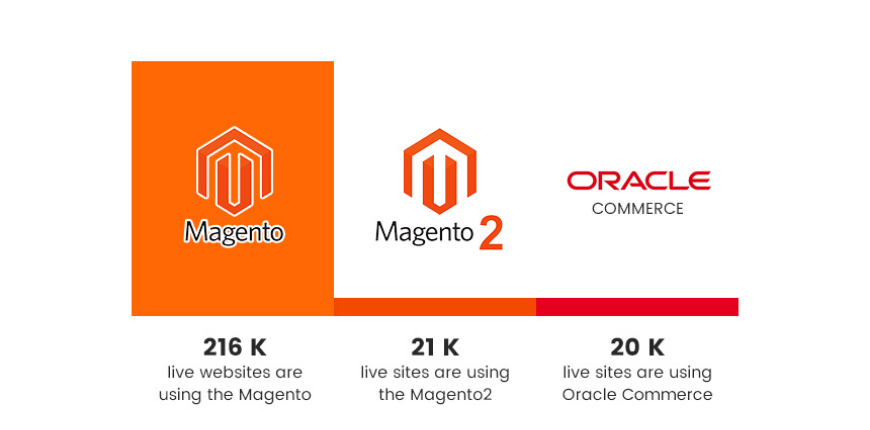
Hard-to-forecast TCO
Not only is Magento more cost-effective than Oracle Commerce, but it’s easier to predict the total cost before commencing the website development process.
Merchants will find it mere to estimate the price of building an Oracle Commerce website because this platform brings a license-based enterprise pricing policy, which is renewed and billed annually.
Limited Third-Party Integrations
Just looking into the market share is enough to recognize who wins in this criterion. Compared to Magento, Oracle Commerce attracts fewer native integrations with 3rd party tools used to deliver above-par UX.
As we all know, non-supported integrations demand custom code, driving up costs and lengthening time-to-market
Lack of Flexibility and Compatibility
Oracle Commerce’s proprietary code base requires specialized developers to implement and customize their platform, so it restricts the self-customization ability in some areas, and the flexibility to adapt to new extensions or technologies.
Because the personalization in Oracle Commerce has been leveled down to business scope, merchants have trouble installing add-ons to upgrade their websites. Instead, they have to rely on Oracle’s team and incur unnecessary expenses.
Deficiency in A Comprehensive B2B Solution
Although Oracle Commerce excels at enhancing brand identity, B2B sellers still have difficulty seeking a comprehensive solution to boost their B2B eCommerce store performance. B2B features in this platform are torn and personalized, leaving users confused.
Narrower Commerce-Driven Ecosystem
Frankly, Oracle Commerce may have a large developer ecosystem, but its commerce community is significantly smaller than Magento’s. In other words, compared to Magento, Oracle can only offer their clients limited options of partners who have expertise in implementing eCommerce solutions across different industries, geographies, or use cases.
Magento platform undoubtedly has many advantages over Oracle. If you are considering migrating your store to Magento, please get in touch with BSS’s Magento migration service immediately.
Additionally, delve into this Magento alternatives to choose the best eCommerce solution for your business
In Conclusion
Magento vs Oracle – the two biggest B2B e-commerce platforms that are ideal for building medium and large B2B enterprises. I hope that you can make the best decision for a suitable platform for your wholesale business after reading the useful knowledge in this article.
BSS Commerce is one of the leading Multi-platform eCommerce solutions and web development services providers in the world. With experienced and certified developers, we commit to bringing high-quality products and services to optimize your business effectively.
If you are planning to build a B2B website, leave us your information and ideas in the following form. We will contact you soon to give you the best consultation.
